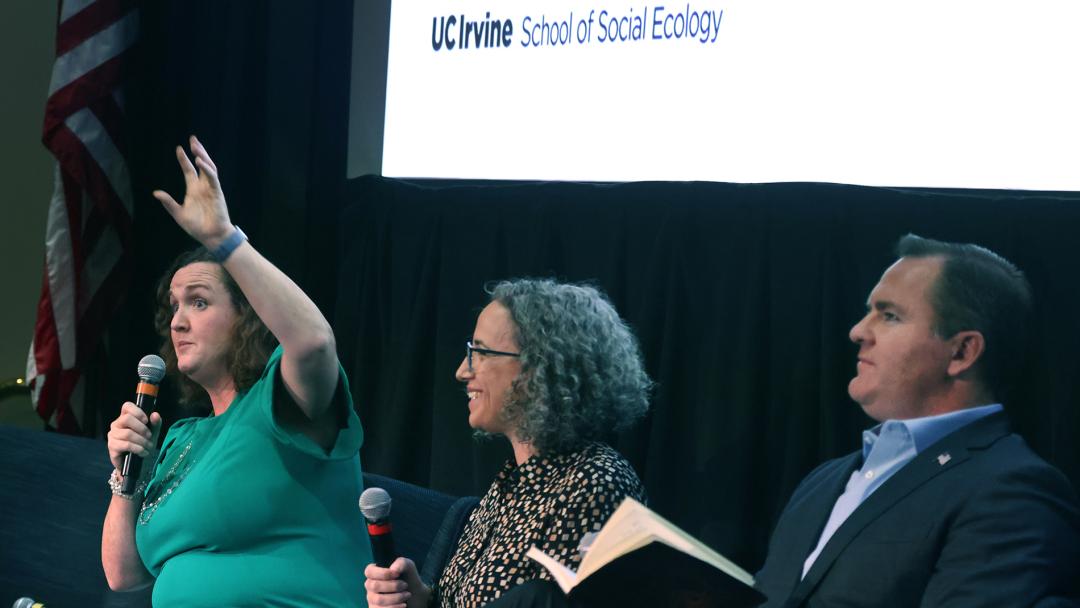
From left are Congresswoman Katie Porter, journalist Laurel Rosenthal and Newport Beach Mayor Will O’Neill. They participated in the recent What Happened and Why post election discussion, hosted by the School of Social Ecology and the Los Angeles Times. Inset photos from top: Mark Z. Barabak, Melanie Mason, Jenny Medina and Mike Madrid, Ken Goldstein and Jon Gould. Photos by Karen Tapia
Journalists, pundits, politicians say voters considered their pocketbooks at the polls
A number of exit polls, including the UC Irvine School of Social Ecology’s UCI-OC Poll, found the main answer to why voters voted the way they did in the November election: personal finances.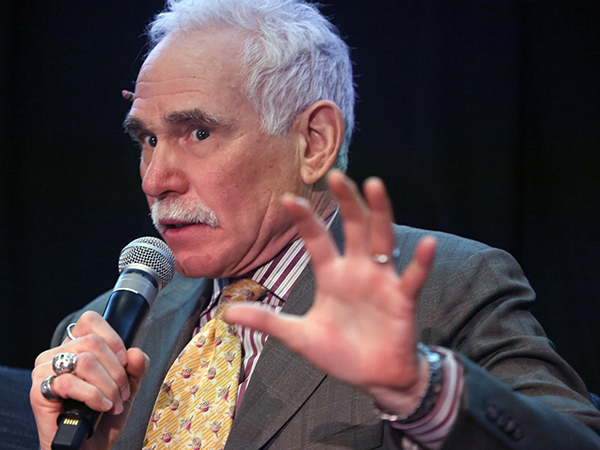
“It was the economy,” Los Angeles Times columnist Mark Z. Barabak told an auditorium full of political observers, community leaders and educators Dec. 6 at a three-hour discussion on campus on what happened at the polls and why.
“There's nothing more urgent than people's pocketbook issues,” added Melanie Mason, a senior reporter with Politico.
Mason, Barabak and fellow politics writers Seema Mehta of the Los Angeles Times and Jenny Medina of the New York Times shared stories about the people they interviewed during election season. All emphasized how many people talked about their worries over making mortgage payments, concerns that their children could not afford to move out and having to work multiple jobs to make ends meet among myriad other money issues.
Their discussion was part of the first panel at the “What Happened and Why” post-election event, presented by the School of Social Ecology and the Los Angeles Times.
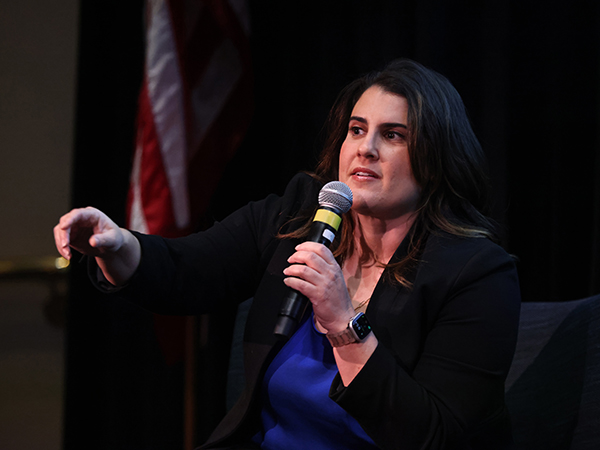 The second discussion featured panelists Marva Diaz, publisher of the California Target Book; Ken Goldstein, pollster for the UCI-OC Poll and professor of politics at the University of San Francisco; Mike Madrid, School of Social Ecology senior fellow and a leading expert on Latino voters; Dan Schnur, a professor of government studies, politics, communications and leadership at UC Berkeley, Pepperdine University and USC; and moderator Laura J. Nelson, a Los Angeles Times politics reporter. They talked about the results of post-election polls, providing analysis of trends and changes in the vote.
The second discussion featured panelists Marva Diaz, publisher of the California Target Book; Ken Goldstein, pollster for the UCI-OC Poll and professor of politics at the University of San Francisco; Mike Madrid, School of Social Ecology senior fellow and a leading expert on Latino voters; Dan Schnur, a professor of government studies, politics, communications and leadership at UC Berkeley, Pepperdine University and USC; and moderator Laura J. Nelson, a Los Angeles Times politics reporter. They talked about the results of post-election polls, providing analysis of trends and changes in the vote.
They touched on the UCI-OC Poll that found that half of Orange County’s voters reported dissatisfaction with their economic situation and 50 percent believe the future of democracy in America is insecure.
The county interestingly went for Democrat Kamala Harris for president and Republican Steve Garvey for Congress. Madrid called the county a peculiar but “perfect petri dish to help us understand what is happening at a time of really significant transformation in our politics.”
Added Schnur: “When we talk about Orange County, when we talk about even deep blue California, we are talking about the United States of America.”
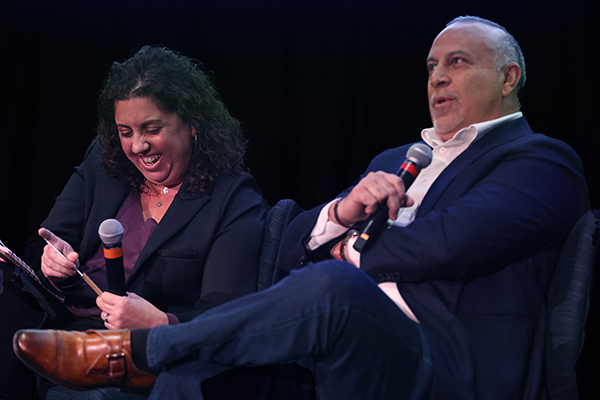 He shared statistics that he said have “nothing to do with politics and, therefore, everything to do with politics.”
He shared statistics that he said have “nothing to do with politics and, therefore, everything to do with politics.”
Noting the education gap in American politics, Schnur explained the reasons why:
“One — the average high school graduate will earn about $1 million less over their lifetime than the average four-year college graduate. Two — the average person without a four-year college degree lives about eight years less than the average four-year college grad. Three — 35 percent of high school graduates are obese compared with 25 percent of four-year college grads. Four — high school grads are much less likely to get married and women with high school degrees are twice as likely to divorce within 10 years of marrying as women with college degrees. Five — nearly 60 percent of births to women with a high school degree or less happen out of wedlock. That's roughly five times higher than the rate for women with at least a bachelor's degree. Six — the opioid death rate for those with a high school degree is about 10 times higher than those with a bachelor degree.”
It’s no wonder, Schnur said, that young working class men are resentful and angry. “Donald Trump was able to tap into those frustrations more effectively than other politicians, especially on issues like inflation,” he said.
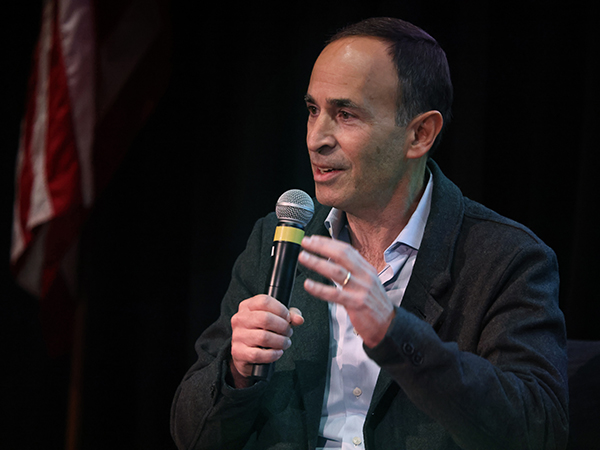 The third panel discussion, featuring Congresswoman Katie Porter and Newport Beach Mayor Will O’Neill, focused on the implications of the election for the future of the Democratic and Republican parties. Laurel Rosenhall, of the Los Angeles Times, moderated.
The third panel discussion, featuring Congresswoman Katie Porter and Newport Beach Mayor Will O’Neill, focused on the implications of the election for the future of the Democratic and Republican parties. Laurel Rosenhall, of the Los Angeles Times, moderated.
“Californians feel unsafe, and you know darn well we do because Prop. 36 just passed by about 70 percent,” O’Neill said. “Crime is the No. 1 issue. This is going to come back to bite Democrats really hard in two years if that’s not a main focus.”
Another factor contributing to the Democrats’ defeat this year was issues involving the cost of living, Rosenhall said. “It’s enormous. Homelessness, rent, groceries, gasoline, all of those things.”
Porter said Democrats need “to do things.”
“It’s not about what you say,” she said. “At some point, you have to have some proof points and I think President Biden and the Democratic administration had a number of good proof points on things like manufacturing jobs and green energy, but they didn’t have proof points on what are most families’ biggest expenses — housing, childcare and college.”
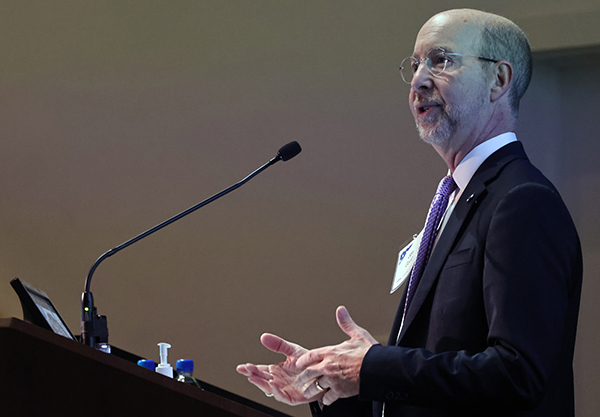 She said Democrats have been talking about housing but neither party has solutions and both need to come up with better ideas.
She said Democrats have been talking about housing but neither party has solutions and both need to come up with better ideas.
Listening carefully were elected officials and political observers, who praised the school and the newspaper for presenting the event.
“Seldom do we get together to discuss election outcomes in Orange County,” said Rose Espinoza, mayor pro tem of La Habra. “I found the discussion invaluable.”
That was the aim, said Jon Gould, dean of the School of Social Ecology.
“Community engagement is an essential pillar to building and sustaining a strong democracy,” he told the audience. “Today’s discussions are hardly the end of the School of Social Ecology’s engagement on these topics.”
He pointed to the school’s UCI-OC Poll, which was released on the same day of the event, and teased the next poll, which will be released next month and will reveal Orange County residents’ attitudes toward economic issues, abortion, crime and border issues.
“This truly is a purple county that we live in right now and it really is the bellwether of changes that we are seeing going on in the nation,” Gould said. “Whatever your political affiliation or ideology is, I want to wish you the happiest holidays and let us hope that together our purple county can light a way forward for the country.”
Watch the full event on YouTube.